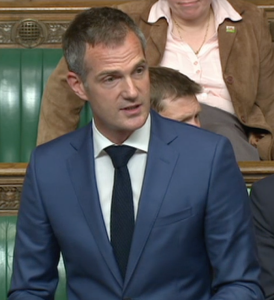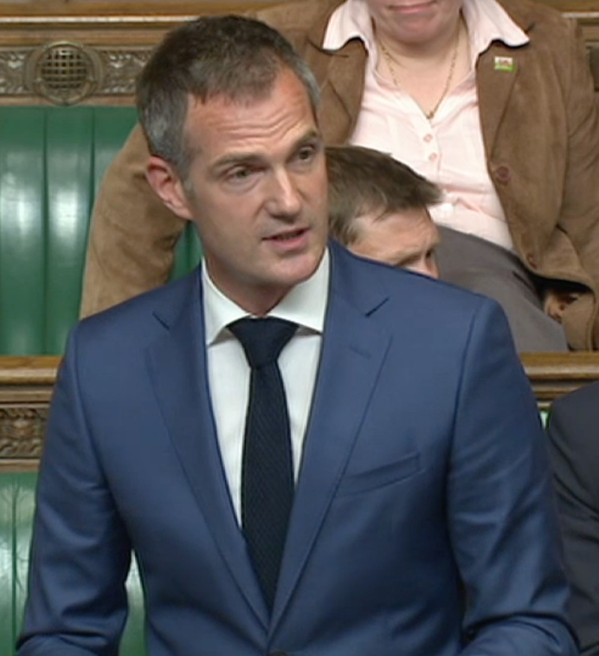Hove MP Peter Kyle raised concerns about care homes as he hosted a Commons debate for the first time yesterday (Wednesday 13 January).
The Labour MP spoke for almost 20 minutes and won praise from the Conservative minister Alistair Burt who responded on behalf of the government.
Mr Kyle said: “I take pride in the fact that my first Westminster Hall debate is on the care that we as a society provide for older generations.
“Care homes are an essential part of our social care network, providing support and residential care for more than 400,000 older people.
“We must reassure older people, families, carers and society at large that we are a country that will continue to offer sustainable, quality, statutorily supported care in what is about to become an extremely difficult funding climate for them.
“This is not the first time that I have raised this topic. The minister will be familiar with the many parliamentary questions I have tabled on the subject.

“As he is personally dedicated to quality care for older people, I know that he will welcome the opportunity to discuss this matter in more detail than would often be the case for a humble backbencher such as me going through the normal channels of parliamentary protocol.
“In many ways, it is strange that we need to have this debate at all. With an ageing population and estimates that the number of people aged 85 and over is set to double over the next 30 years, people would think that having a well-funded and secure network of homes to provide care for later in life would be a given.
“This is the 21st century after all, and we meet in a parliament of one of the world’s largest economies – an economy that was built through the graft and ingenuity of the wartime generation, our security delivered through their sacrifice.
“However, evidence and testimony from care providers points to a sector in a perilous state, primarily for two reasons.
“First, a significant amount of the funding for older people in residential care who lack independent means comes from local authorities, so the significant cuts in local council funding have led to a 17 per cent reduction in real terms in local authority spending on adult social care for older people since 2009-10.
“Industry research cited by ResPublica points to a shortfall between the cost and provision of the average weekly fee paid by local authorities, which worked out as £42 per resident per week in the period between October 2014 to September 2015.
“The pressures on care providers will only be exacerbated by the increases in the minimum wage that will come in from this April.

“However, let me restate my position on the rising minimum wage for the avoidance of any doubt.
“I believe that those working in the caring professions deserve a pay rise for the fantastic jobs that they do, especially considering that it has sadly become a low-pay sector.
“I am glad that there is now cross-party consensus on the ambitious rise that is deserved by all those on low pay.
“However, we must make this work, and it will only work if we are aware of and prepare for what will happen in the areas that this will impact on hardest.
“The National Care Association, for example, has estimated that the rise will add at least 5 per cent to payrolls this year and a further 7 per cent year on year by 2020.
“Without extra resources, local authorities will end up pushing independent, statutorily funded care homes closer to the brink.
Shocking
“The excellent ResPublica report from November laid bare the startling and shocking fact that an unfunded living wage could end up with the loss of 37,000 care home places.
“I know that the minister and his colleagues will point to two actions that they think will mitigate that, so let me address both of those in turn.
“First, there is the social care precept. Introduced in the autumn statement, it gives local authorities the power to raise council tax by an additional 2 per cent, the proceeds of which are ringfenced for social care.
“Although all additional funds are welcome, that is a drop in the ocean compared with the additional resources needed.
“Following the autumn statement, the King’s Fund estimated that the funding gap for social care could be as high as £3.5 billion by the end of this parliament.
“What is more, the precept may well end up generating extra revenue where it is least needed.
“At present, residential care home funding is split between people who pay for their care themselves and those who have it paid for by their local authority.
“Self-funders pay 50 per cent more than those funded by councils so, in effect, they subsidise those paid for by the public purse.
Risk
“It is not hard to work out that the homes with a smaller number of self-funders are the ones who are most at risk financially from the cut in funding rates from local authorities.
“The split varies across the country, but on the estimated figures put together by LaingBuisson in its Care of Older People UK Market Report, the number of self-funders in 2014 was only 18 per cent in the north east, with the majority of other regions hovering around the 40 per cent mark.
“It is pretty obvious that the power to raise council tax will generate the most revenue in the areas with a higher council tax base, namely the southern regions of England, which – you guessed it – have a higher number of self-funders.
“Secondly, on the Better Care Fund, ministers have belatedly recognised some of the flaws in simply relying on a precept to generate the extra funds needed for social care.
“There is simply not enough revenue being generated in poorer areas. The government have said they will take that into account and use a formula for allocating extra funds for these areas taken from the Better Care Fund.
“That was announced less than a month ago and we wait to see exactly how the details will operate in practice.
“There are murky areas and a lot of detail is coming. We must make sure we know exactly how this will impact providers in the front line.
Concern
“Care England, a leading representative body for the independent care services, has already voiced its concern.
“It doubts whether the funding will get to the care homes that need it most. It is more likely that it will be used on other unfunded projects across the social care budget.
“It is worth remembering that the initial funding for the Better Care Fund was not new money. It was funding to assist health services which was reallocated to local authorities.
“I want to give the minister the opportunity today to confirm whether the £1.5 billion is new money or is again taken from existing health service budgets.
“Local authorities will not see any of this money, whether new or recycled, until 2017-18 and even then it will be only £105 million.
“It could be too little, too late to prevent parts of our care home sector catering for the most vulnerable people in our society collapsing or withdrawing from the market and focusing on self-funding residents.
“Initial better care fund plans have been signed off by local authorities and NHS England.
“It would be great if an evaluation was conducted into how the funding to date has helped to support residential care homes, if at all.
Viability
“I think the minister can now see that there is cross-party support for this kind of independent evaluation into how funding mechanisms are impacting on frontline care provision.
“It could act as a best practice guide for authorities going forward, even when the extra resources the government referred to become available.
“Will the minister commit to this evaluation covering the impact of funding on the sector? Both government and opposition members would find that helpful.
“The majority of media coverage of the sector has been about the state of big providers, such as Four Seasons Health Care and HC-One, and speculation about their future viability.
“It is important to realise that the 10 largest providers account for about only 25 per cent of the market, the rest being much smaller, independent providers.
“In my constituency there is a small family home, Wilbury Rest Home. Last year I sat down with the owner, Graham Dean, shortly after the Chancellor’s announcement on the living wage.
“Graham is the second generation of his family to run the home and, remarkably, he was born in it.
“Listening to him and other local independent care home managers talking with kindness, compassion and outright professionalism about the people they care for day in and day out has left a deep impression on me.
Caring
“They provide the kind of loving, caring environment that every human being deserves into their old age.
“There are countless homes like that dotted around the country but they are being pushed to the limit.
“Indeed, a survey from the National Care Association shows that almost a quarter of providers could exit the market altogether.
“That would be a tragedy for residents and society, and a crisis for the government.
“Another issue that is putting pressure on the sector is the national shortage of nurses, which has resulted in the increased use of agency nurses. In some cases that costs double the amount for permanent staff.
“To the government’s credit, they have recognised that there is an issue and have been working with the care sector and with the government’s skills body to develop a new training scheme to create a career ladder into caring professions.
“Sadly, that project was axed last December, just weeks before it was due to be launched. I understand from written answers that I have received that that was not a decision taken by the Department of Health.
“As a member of the Select Committee on Business, Innovation and Skills, I am happy to take up this cause with the relevant ministers in that department if the minister feels that would be helpful.
Collapse
“I would like to aid his work and I hope that his officials have already been doing much work behind the scenes to fight for its reinstatement.
“As I move to my closing remarks, I would appreciate some reassurance from the minister that the government have a plan – dare I say it, a plan B – that is ready to be implemented should the worst-case scenario predicted by ResPublica and other respected think-tanks in the health sector come to pass.
“Do the government have in place a robust contingency plan should the statutorily funded care home sector collapse, resulting in the nightmare scenario of 37,000 older people becoming homeless?
“When Southern Cross Healthcare went bust in 2011, there were just enough resources from other providers in the sector to take over.
“Due to the current state of the industry, no private provider has the capacity to respond to a shortfall of 37,000 beds.
“It may not be a Southern Cross that fails first. In fact, it is most likely to be the smaller, independent providers in areas that are most dependent on local authority placements.
“Can the minister reassure us that his department and local government have the capacity to respond to any piecemeal closures that are likely to occur?”
Hansard recorded that the Minister for Community and Social Care Alistair Burt indicated assent.
Dignity
Mr Kyle said: “The minister is nodding and I look forward to testing the argument in his statement.
“Everyone here wants to ensure dignity for all later in life. That can be assured only if there is a properly resourced residential care sector with stability and financial security.
“I look forward to hearing the minister’s response and receiving reassurances that all members, of whatever party, want to hear, and I look forward to being able to work with him and care home providers in the months and years ahead to ensure that that type of residential care sector becomes a reality.”
Mr Burt said: “I congratulate the honourable member for Hove (Peter Kyle) on securing the debate and thank him for introducing it courteously and knowledgeably.
“He is a valuable addition to the House, as indeed are a number of the new members who have spoken.
“This is another example of a debate where the House’s knowledge and passion is conveyed in an entirely reasonable but challenging manner.”
He addressed some of the points raised by Mr Kyle and others taking part in the Westminster Hall debate.
Mr Burt concluded by saying: “I will speak about contingency plans briefly. Local authorities now have a responsibility, through the Care Act 2014, to monitor the care providers in their area for any early warning of difficulties. In total, 44 care providers are included.
Failure
“Local councils are also under a duty to provide contingency plans for what would happen if there was a failure of provision and 95 per cent of local authority areas are currently covered by such contingency plans.
“Of course, I am looking for answers from the other 5 per cent to ensure that coverage is there.
“If there is a failure of provision, local authorities have a responsibility to step in and we are addressing the situation to ensure that contingency provision is in place.
“We believe that we have put in money that will assist the system and provide the care that is needed.
“With local authorities, we are constantly looking at what can be done to make things more efficient. We want to ensure that money is spent properly.
“That is why the social care precept is there. It can only be spent on social care.
“I have mentioned the position of councils that might be in particular difficulties over that issue and, over time, we will see whether that provision is sufficient.
“The government and I will keep this issue under constant review and we will talk about it again.”









